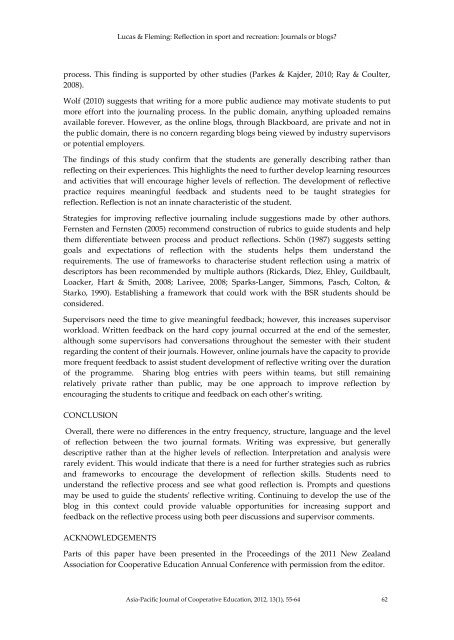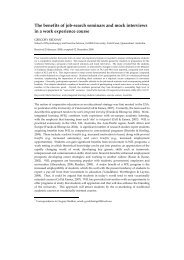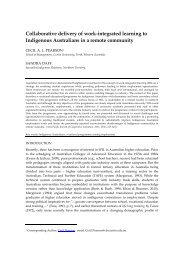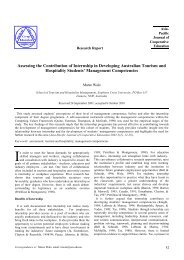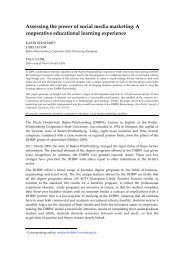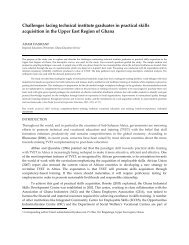Reflection in sport and recreation cooperative education: Journals or ...
Reflection in sport and recreation cooperative education: Journals or ...
Reflection in sport and recreation cooperative education: Journals or ...
You also want an ePaper? Increase the reach of your titles
YUMPU automatically turns print PDFs into web optimized ePapers that Google loves.
Lucas & Flem<strong>in</strong>g: <strong>Reflection</strong> <strong>in</strong> <strong>sp<strong>or</strong>t</strong> <strong>and</strong> <strong>recreation</strong>: <strong>Journals</strong> <strong>or</strong> blogs?<br />
process. This f<strong>in</strong>d<strong>in</strong>g is supp<strong>or</strong>ted by other studies (Parkes & Kajder, 2010; Ray & Coulter,<br />
2008).<br />
Wolf (2010) suggests that writ<strong>in</strong>g f<strong>or</strong> a m<strong>or</strong>e public audience may motivate students to put<br />
m<strong>or</strong>e eff<strong>or</strong>t <strong>in</strong>to the journal<strong>in</strong>g process. In the public doma<strong>in</strong>, anyth<strong>in</strong>g uploaded rema<strong>in</strong>s<br />
available f<strong>or</strong>ever. However, as the onl<strong>in</strong>e blogs, through Blackboard, are private <strong>and</strong> not <strong>in</strong><br />
the public doma<strong>in</strong>, there is no concern regard<strong>in</strong>g blogs be<strong>in</strong>g viewed by <strong>in</strong>dustry supervis<strong>or</strong>s<br />
<strong>or</strong> potential employers.<br />
The f<strong>in</strong>d<strong>in</strong>gs of this study confirm that the students are generally describ<strong>in</strong>g rather than<br />
reflect<strong>in</strong>g on their experiences. This highlights the need to further develop learn<strong>in</strong>g resources<br />
<strong>and</strong> activities that will encourage higher levels of reflection. The development of reflective<br />
practice requires mean<strong>in</strong>gful feedback <strong>and</strong> students need to be taught strategies f<strong>or</strong><br />
reflection. <strong>Reflection</strong> is not an <strong>in</strong>nate characteristic of the student.<br />
Strategies f<strong>or</strong> improv<strong>in</strong>g reflective journal<strong>in</strong>g <strong>in</strong>clude suggestions made by other auth<strong>or</strong>s.<br />
Fernsten <strong>and</strong> Fernsten (2005) recommend construction of rubrics to guide students <strong>and</strong> help<br />
them differentiate between process <strong>and</strong> product reflections. Schön (1987) suggests sett<strong>in</strong>g<br />
goals <strong>and</strong> expectations of reflection with the students helps them underst<strong>and</strong> the<br />
requirements. The use of framew<strong>or</strong>ks to characterise student reflection us<strong>in</strong>g a matrix of<br />
descript<strong>or</strong>s has been recommended by multiple auth<strong>or</strong>s (Rickards, Diez, Ehley, Guildbault,<br />
Loacker, Hart & Smith, 2008; Larivee, 2008; Sparks-Langer, Simmons, Pasch, Colton, &<br />
Starko, 1990). Establish<strong>in</strong>g a framew<strong>or</strong>k that could w<strong>or</strong>k with the BSR students should be<br />
considered.<br />
Supervis<strong>or</strong>s need the time to give mean<strong>in</strong>gful feedback; however, this <strong>in</strong>creases supervis<strong>or</strong><br />
w<strong>or</strong>kload. Written feedback on the hard copy journal occurred at the end of the semester,<br />
although some supervis<strong>or</strong>s had conversations throughout the semester with their student<br />
regard<strong>in</strong>g the content of their journals. However, onl<strong>in</strong>e journals have the capacity to provide<br />
m<strong>or</strong>e frequent feedback to assist student development of reflective writ<strong>in</strong>g over the duration<br />
of the programme. Shar<strong>in</strong>g blog entries with peers with<strong>in</strong> teams, but still rema<strong>in</strong><strong>in</strong>g<br />
relatively private rather than public, may be one approach to improve reflection by<br />
encourag<strong>in</strong>g the students to critique <strong>and</strong> feedback on each other's writ<strong>in</strong>g.<br />
CONCLUSION<br />
Overall, there were no differences <strong>in</strong> the entry frequency, structure, language <strong>and</strong> the level<br />
of reflection between the two journal f<strong>or</strong>mats. Writ<strong>in</strong>g was expressive, but generally<br />
descriptive rather than at the higher levels of reflection. Interpretation <strong>and</strong> analysis were<br />
rarely evident. This would <strong>in</strong>dicate that there is a need f<strong>or</strong> further strategies such as rubrics<br />
<strong>and</strong> framew<strong>or</strong>ks to encourage the development of reflection skills. Students need to<br />
underst<strong>and</strong> the reflective process <strong>and</strong> see what good reflection is. Prompts <strong>and</strong> questions<br />
may be used to guide the students' reflective writ<strong>in</strong>g. Cont<strong>in</strong>u<strong>in</strong>g to develop the use of the<br />
blog <strong>in</strong> this context could provide valuable opp<strong>or</strong>tunities f<strong>or</strong> <strong>in</strong>creas<strong>in</strong>g supp<strong>or</strong>t <strong>and</strong><br />
feedback on the reflective process us<strong>in</strong>g both peer discussions <strong>and</strong> supervis<strong>or</strong> comments.<br />
ACKNOWLEDGEMENTS<br />
Parts of this paper have been presented <strong>in</strong> the Proceed<strong>in</strong>gs of the 2011 New Zeal<strong>and</strong><br />
Association f<strong>or</strong> Cooperative Education Annual Conference with permission from the edit<strong>or</strong>.<br />
Asia-Pacific Journal of Cooperative Education, 2012, 13(1), 55-64 62


